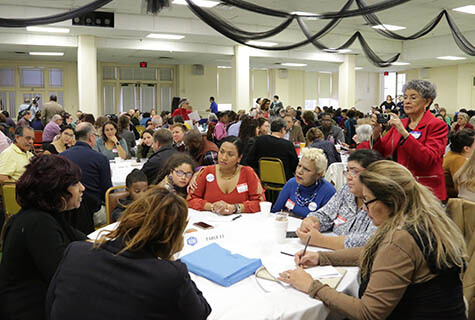This is the sound of San Antonio talking about its housing crisis one weekend in 2017:
- The city of San Antonio should amend its charter to allow a funding stream for a rehab program for aging single-family homes in the inner city. This could include mobile homes and apartment buildings.
- Less incentives for downtown luxury apartments, and more incentives for affordable housing — both middle- and low-income housing.
- Address the effects of neighborhoods that are gentrifying mainly because of the city’s own center city incentives policy. One idea: Help senior citizens in funding their taxes in gentrifying neighborhoods.
Ideas for how to address San Antonio’s most pressing housing needs flowed toward the end of a three-hour, city-hosted public workshop Saturday at Thiry Auditorium at Our Lady of the Lake University. At least 200 people sat in groups at round banquet tables to discuss housing problems and solutions.
Many of the solutions shared are already taking place, are in the works, or are being researched by the city of San Antonio and other entities. For instance: Owner-occupied home rehabilitation came up repeatedly. The city doles out funds from the federal HOME Investment Partnerships Program to help people rehab their homes, but it isn’t much. Nonprofit Blueprint Ministries does year-round rehab, but programs like these combined barely scratch the surface.
- San Antonio needs a one-stop-shop community housing center or website for housing resources and programs. Many in the community are not aware of the various housing assistance programs — by the government or from nonprofits. There’s a lack of education about homeownership. We talk about preparing our kids for college. Why don’t we prepare people for financial wealth and home ownership?
- Private developers should be required to have 20 percent of their projects be low-income units if they receive any incentives from the city or county.
- Investors need to be held more accountable. If they’re making money in changing neighborhoods, they should be giving back — like a tax that goes toward affordable housing efforts.
The meeting was the first by the Mayor’s Housing Task Force completely devoted to public engagement. The task force began meeting in early October, but the meetings so far have been more of a warm-up sans teeth — that is, meetings absent of actionable ideas to truly address San Antonio’s housing crisis, especially the big three issues of lack of affordable housing, home affordability and gentrification.
Saturday’s meeting was designed to inform the task force of what the community wants.
- Better communication between developers and neighborhoods. Many developers are not really looking at neighborhood plans. Neighborhoods should be clued into upcoming projects instead of learning about projects after the fact. On the flip side, neighborhood associations have to be willing to listen.
- Weave affordable housing into the fabric of existing neighborhoods.
- There’s a need for an ethics board to hold developers and investors accountable.
The meeting drew a contrast that was hard to ignore. On one end of the spectrum were a handful of residents from the Alazan-Apache Courts on the near West Side. On the other end were more well-to-do residents and city officials whose job it is to carry out some of the current policies that cause gentrification. There was definitely a sense of: You want us to voice our concerns? Well, here you go.
- There needs to be a clear definition of what affordability means and who it’s for. If lower-wage city employees cannot afford a home, than that home is not affordable.
- Increase code compliant to help ensure beautiful and safe neighborhoods.
- Balance the powerful voice (developers, lobbyists, etc.) with the community voice. Sometimes it’s the community voice that gets drowned.
The task force is expected to use the feedback collected from Saturday’s workshop to craft final policy changes that are scheduled to be presented to the public in May. Dozens of additional public meetings are expected between now and then.
- Legal help from the city in clearing titles. It’s really difficult to finance anything if you don’t have a clear title on the house.
- Bring together the different nonprofits that work with the homeless to form a coalition that can address issues and lobby the Texas Legislature.
- More transparency. When we have these meetings, solutions are discussed, but they are not followed through on.
This article was originally published by the H.E. Butt Foundation’s Folo Media initiative in 2017.

